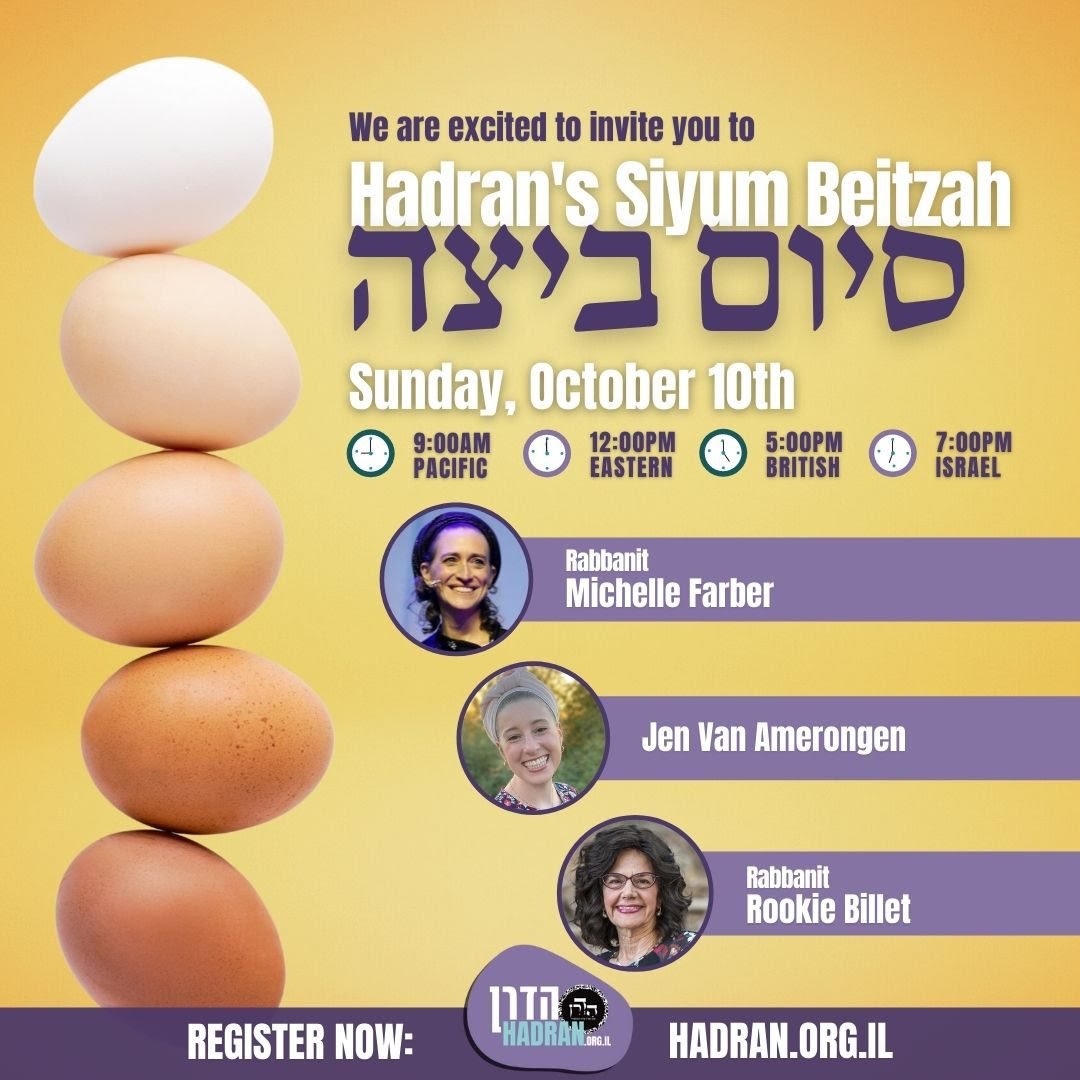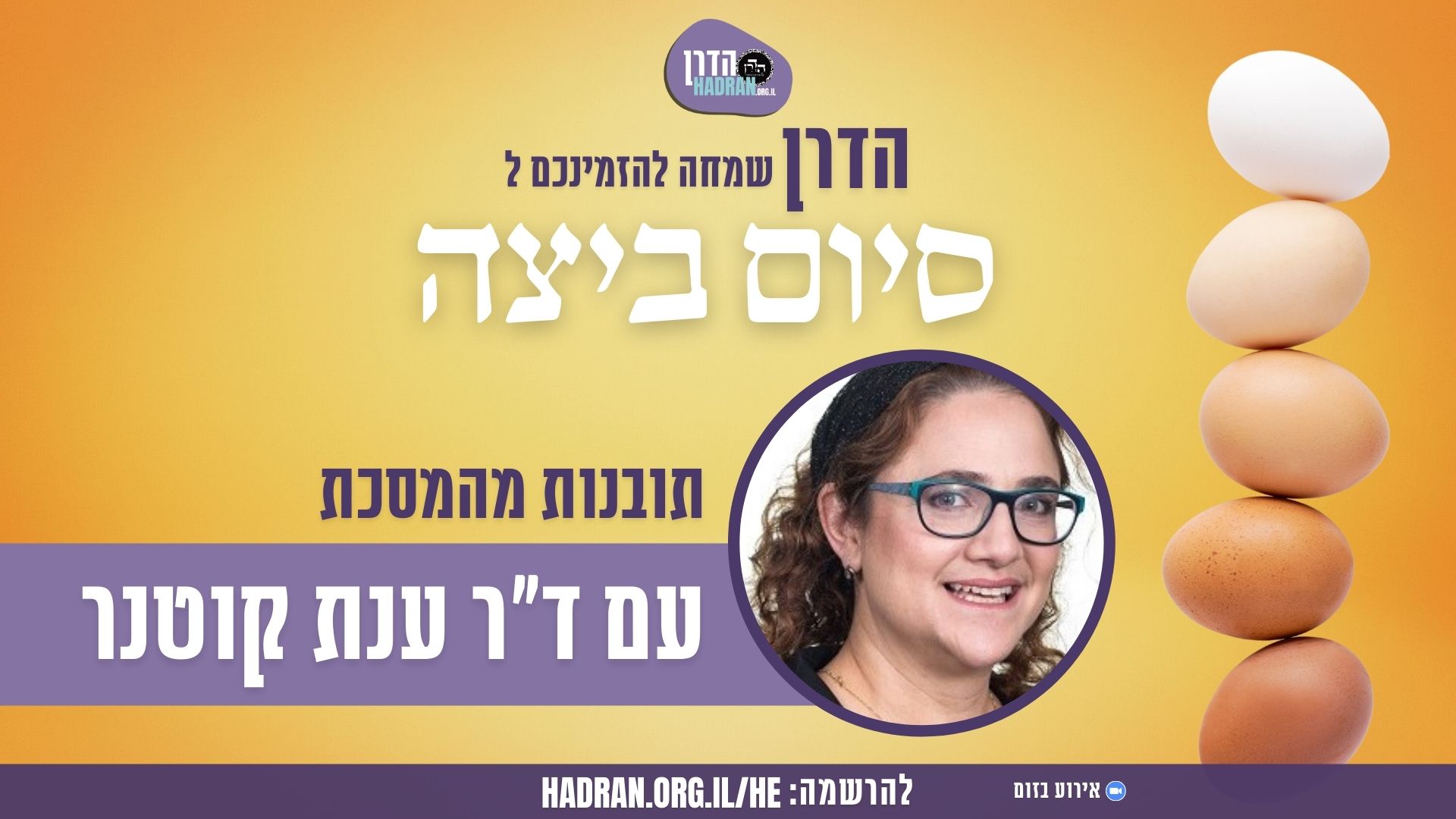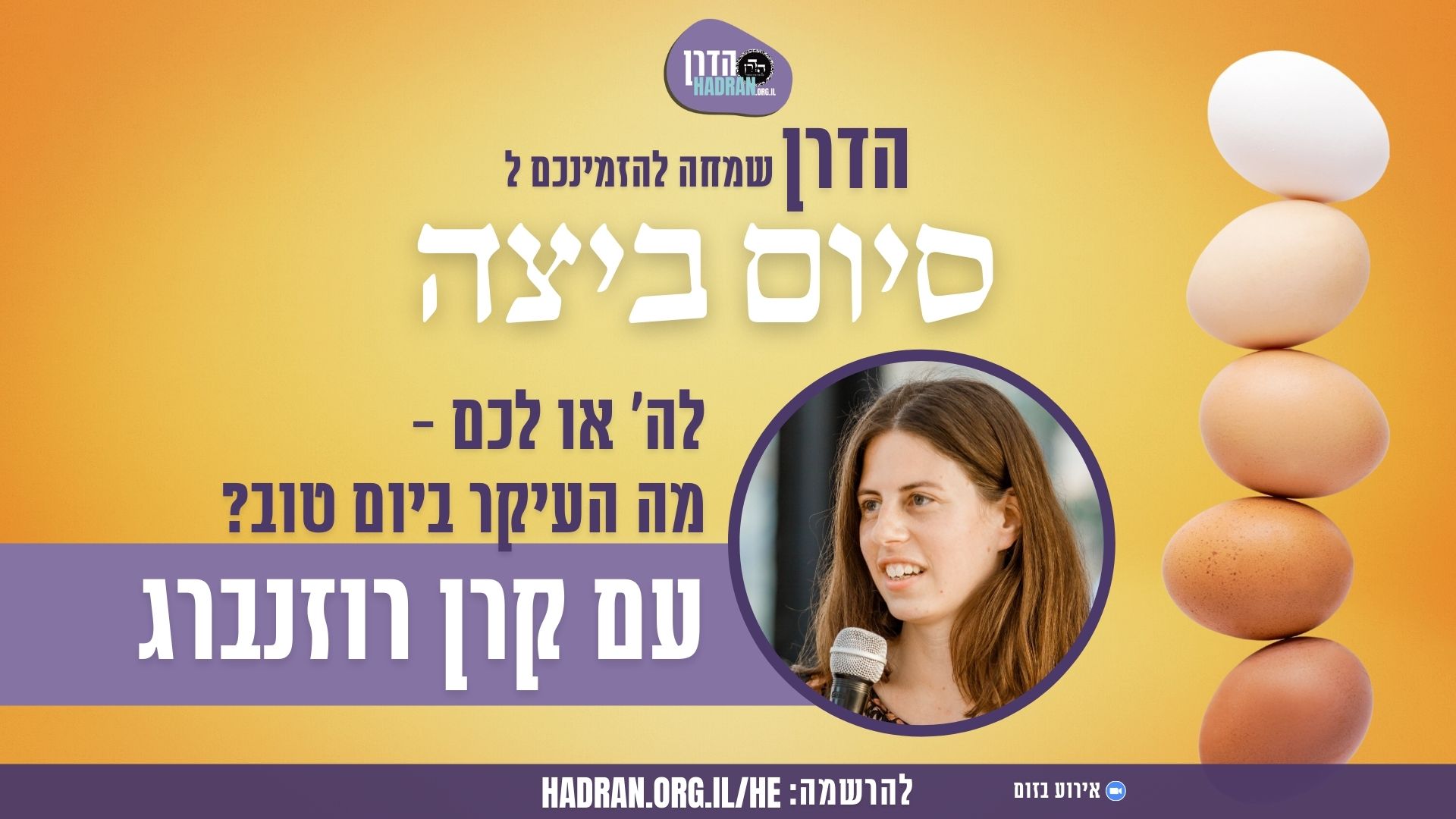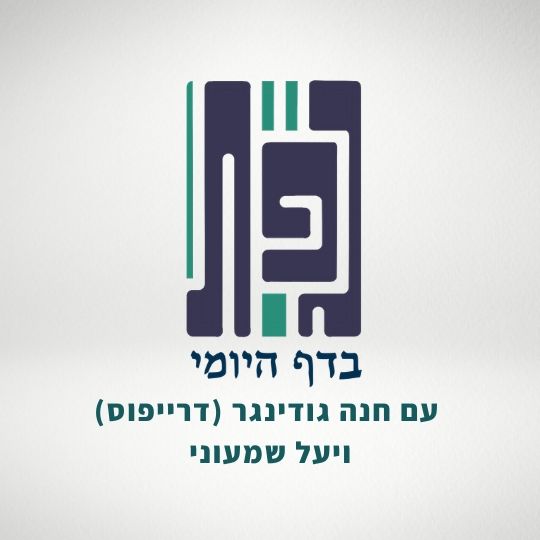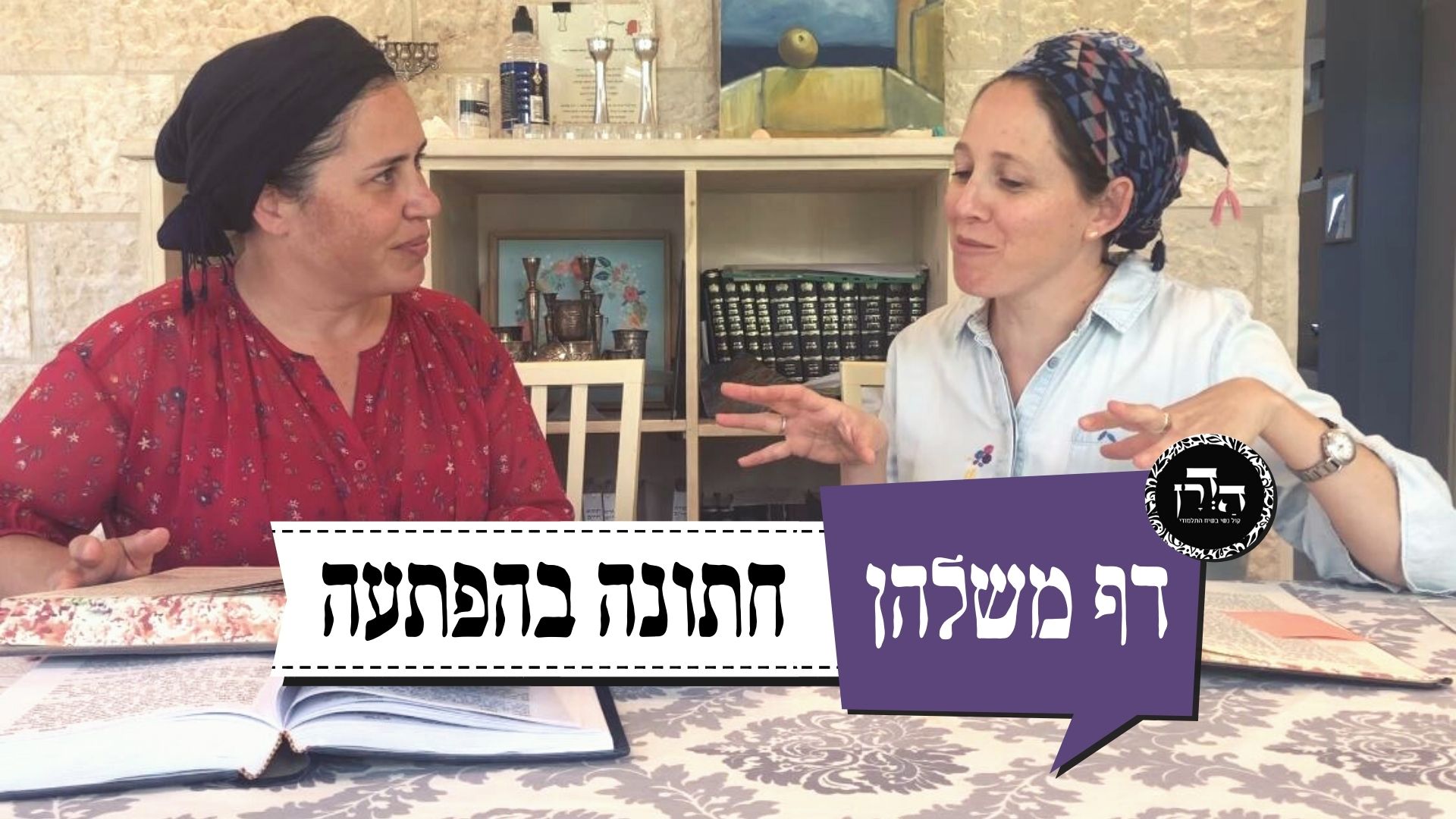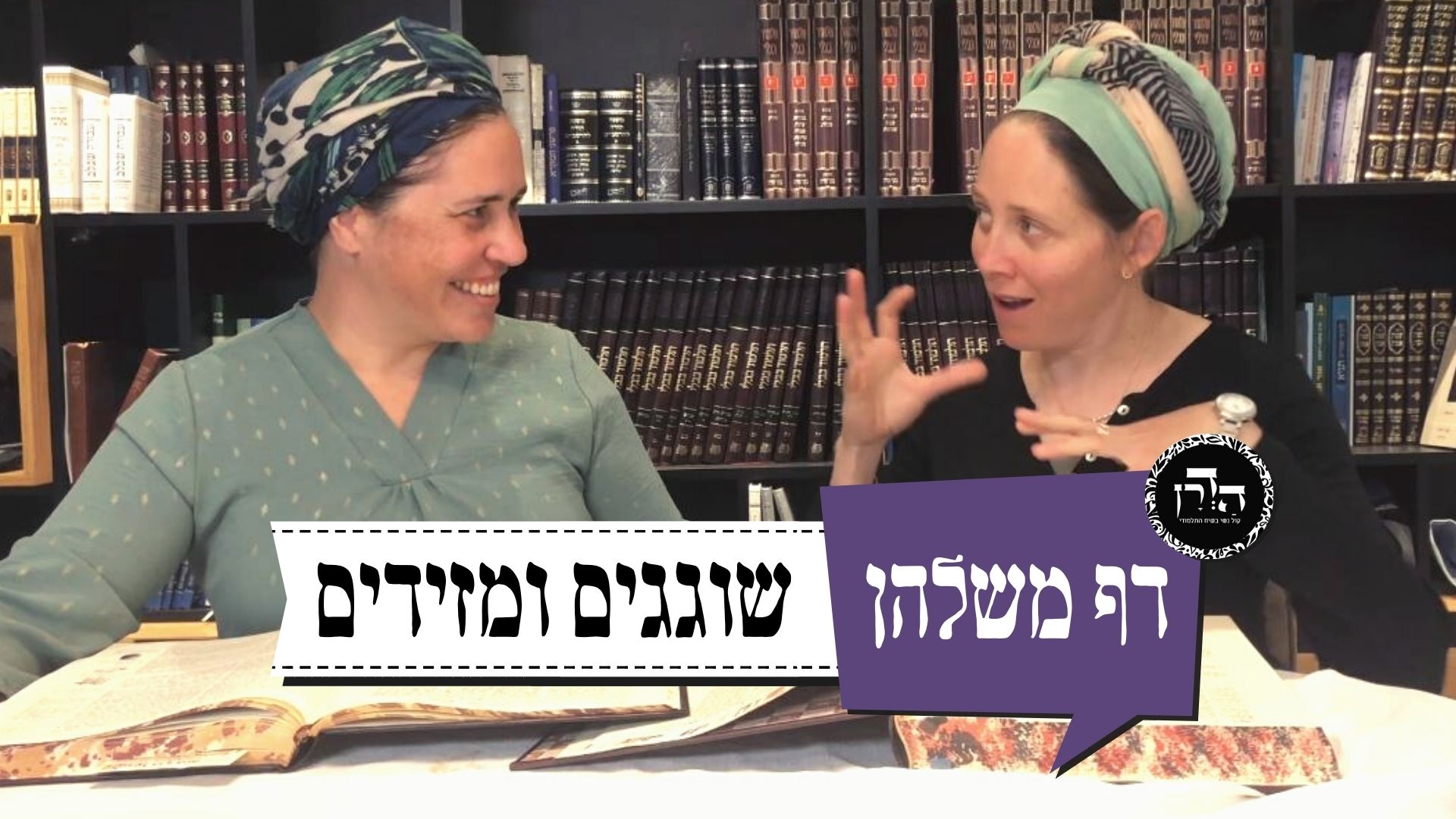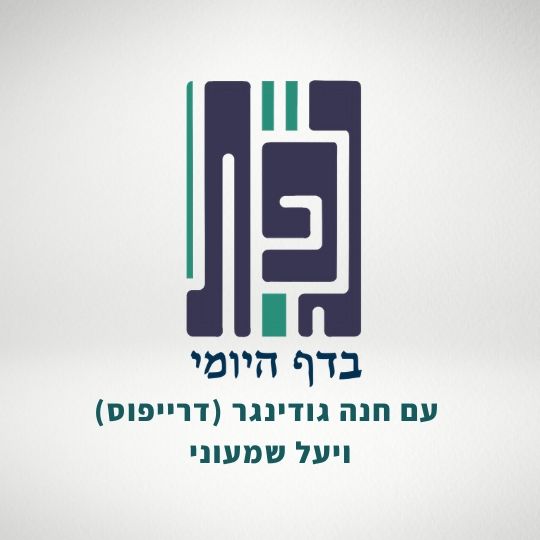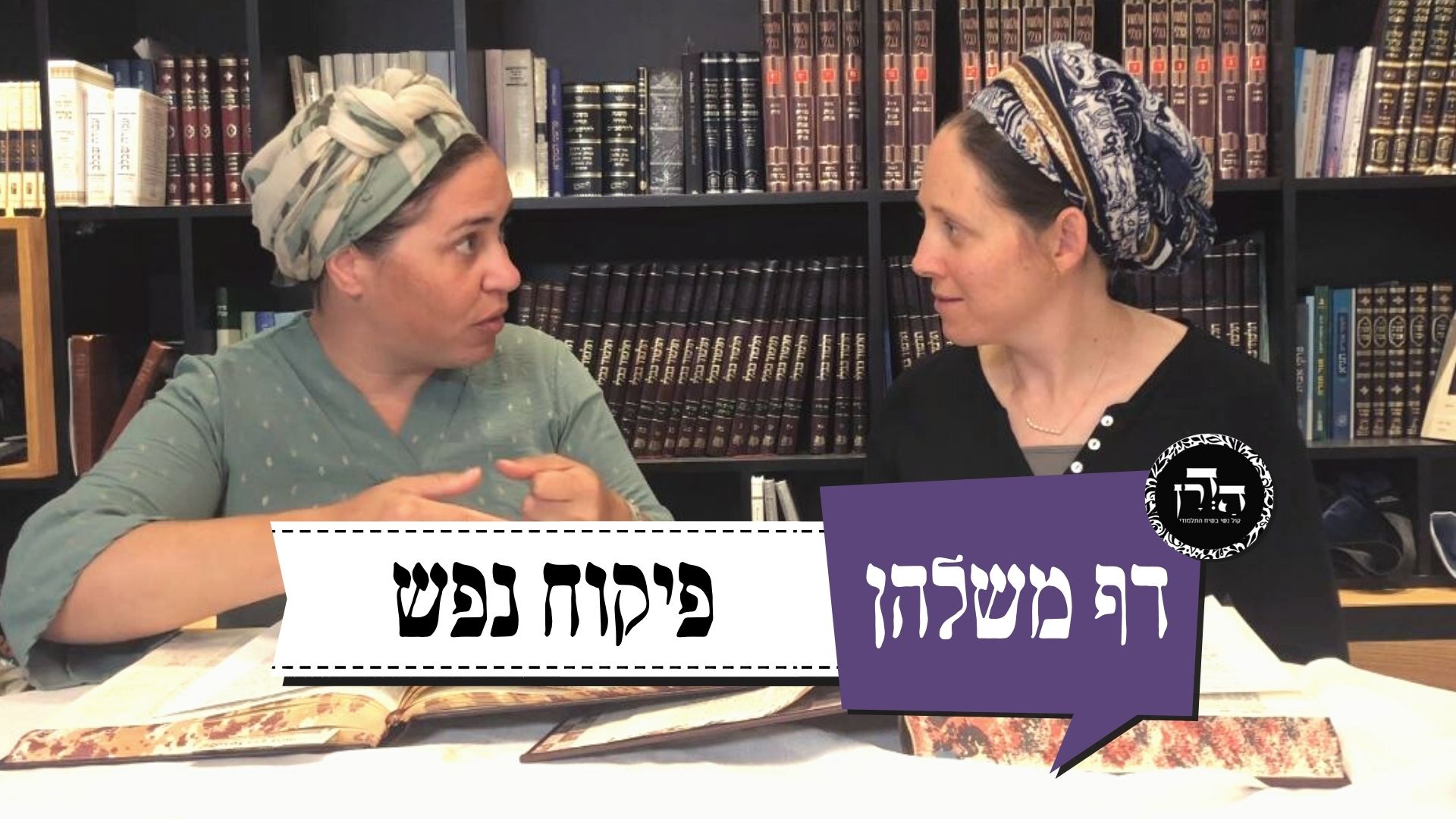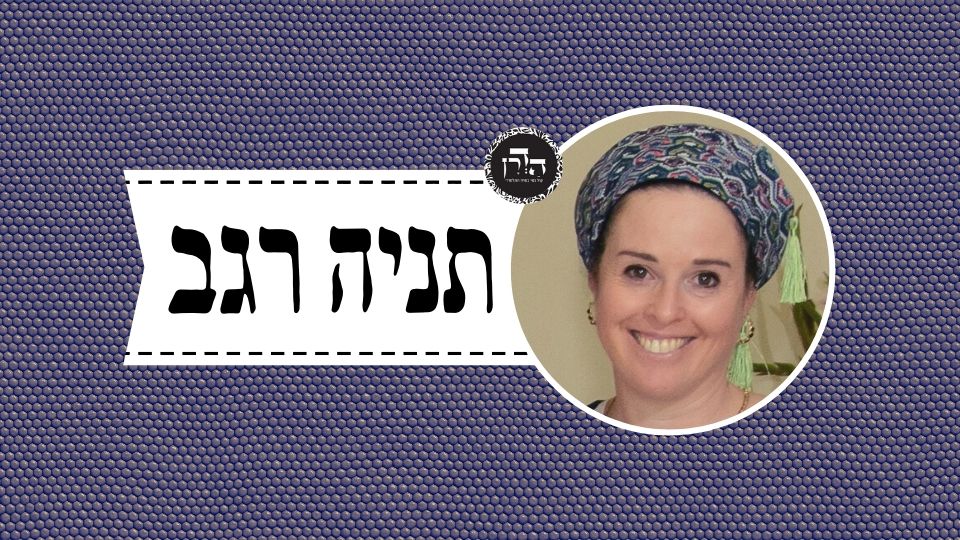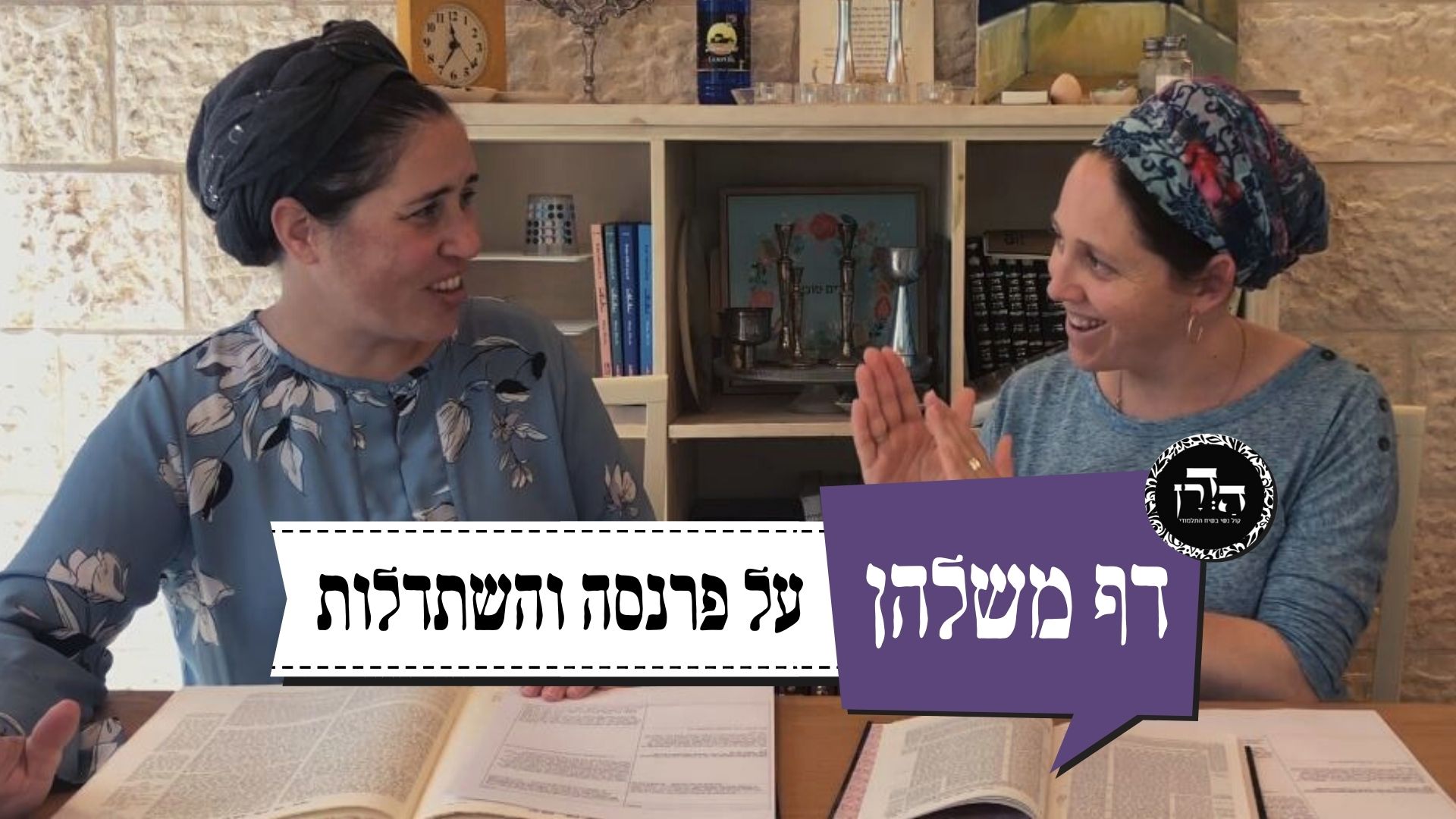איך התירו לקבור מתים ביום טוב? ביום טוב ראשון התירו על ידי נכרים וביום טוב שני מותר על ידי ישראל. יש דיון לגבי יום טוב שני של ראש השנה – האם מותר כיום טוב שני של גלויות או לא? האם ההיתר לטפל במת רק אם הוא מת לפני יום טוב ואי אפשר לחכות עד אחרי החג משום כבוד המת? בגלל חשש שנכרים יראו אותם קוברים ויחשבו שמותר מלאכה, רבינא אסר לקבור מת היום טוב שני. האם אפשר להניח עירוב תבשילין ביום טוב? האם גם בראש השנה? יש מחלוקת רב ושמואל או ר’ יוחנן בעניין הדין של אפרוח שנולד ביום טוב. לפי רב שאוסר, מה ההבדל בין זה לבין עגל שנולד שמותר לשוחטו ביום טוב? יש ברייתות לחזק דעותיהם של רב ושמואל/ר’ יוחנן. רב הונא אמר בשם רב שביצה עם יציאתה נגמרת. מה כוונת דבריו? הגמרא מביאה חמש אפשרויות להבין את הדין הזה (חלק בדף ז).

כלים
הלימוד החודש מוקדש לרפואת פיליס הכט, גיטל פעשא בת מאשה רחל על ידי חברותיה הרבות שאוהבות ומעריכות אותה.
כלים
העמקה
רוצה להבין מה באמת קורה מתחת לפני השטח של הסוגיה?
שיעורים, פודקאסטים והרחבות של מיטב המורות שלנו יפתחו לך עוד זוויות וכיווני חשיבה.
חדשה בלימוד הגמרא?
זה הדף הראשון שלך? איזו התרגשות עצומה! יש לנו בדיוק את התכנים והכלים שיעזרו לך לעשות את הצעדים הראשונים ללמידה בקצב וברמה שלך, כך תוכלי להרגיש בנוח גם בתוך הסוגיות המורכבות ומאתגרות.
פסיפס הלומדות שלנו
גלי את קהילת הלומדות שלנו, מגוון נשים, רקעים וסיפורים. כולן חלק מתנועה ומסע מרגש ועוצמתי.
ביצה ו
אָמַר רָבָא: מֵת בְּיוֹם טוֹב רִאשׁוֹן — יִתְעַסְּקוּ בּוֹ עֲמָמִים. מֵת בְּיוֹם טוֹב שֵׁנִי — יִתְעַסְּקוּ בּוֹ יִשְׂרָאֵל, וַאֲפִילּוּ בִּשְׁנֵי יָמִים טוֹבִים שֶׁל רֹאשׁ הַשָּׁנָה. מַה שֶּׁאֵין כֵּן בְּבֵיצָה.
§ Rava said: If one died on the first day of a Festival, gentiles should attend to his burial. If he died on the second day of a Festival, Jews should attend to his burial. And even with regard to the two Festival days of Rosh HaShana, the halakha is that the legal status of the two days is like that of the two days of the Festivals; however, that is not so with regard to an egg that was laid on the first day of Rosh HaShana, as it remains prohibited on the second day.
נְהַרְדָּעֵי אָמְרִי: אַף בְּבֵיצָה. דְּמָה דַּעְתָּיךְ, דִּלְמָא מְעַבְּרִי לֵיהּ לֶאֱלוּל, הָא אָמַר רַב חִינָּנָא בַּר כָּהֲנָא אָמַר רַב: מִימוֹת עֶזְרָא וְאֵילָךְ לֹא מָצִינוּ אֱלוּל מְעוּבָּר.
The Sages of Neharde’a say: Even with regard to an egg, Rosh HaShana is no different from other Festivals, as an egg laid on the first day is permitted on the second. As what do you think i.e., what is your concern; perhaps witnesses will fail to arrive, and the court will proclaim the month of Elul full, i.e., thirty days long, and begin counting the year only from the following day? In that case, both days are kept as sacred ab initio. Didn’t Rav Ḥinnana bar Kahana say that Rav already said in this regard: From the days of Ezra and onward we have not found that the month of Elul was full, as the Sages employed various methods to ensure that there would be no need to add a thirtieth day. Consequently, Rosh HaShana would always occur on the thirtieth day after the beginning of Elul.
אָמַר מָר זוּטְרָא: לָא אֲמַרַן, אֶלָּא דְּאִשְׁתַּהִי. אֲבָל לָא אִשְׁתַּהִי — מַשְׁהִינַן לֵיהּ.
Mar Zutra said: We said that Jews should attend to the dead on the second day of Rosh HaShana only when the burial of the corpse has already been delayed and for some reason the burial was not on the day that he died. In that case, the body might begin to decay, and the dignity of the dead is at stake. However, if the burial has not been delayed, and there is no concern for the dignity of the corpse, its burial may not be attended to on the Festival; rather, we delay it until the Festival has ended.
רַב אָשֵׁי אָמַר: אַף עַל גַּב דְּלָא אִשְׁתַּהִי, נָמֵי לָא מַשְׁהִינַן לֵיהּ. מַאי טַעְמָא, יוֹם טוֹב שֵׁנִי לְגַבֵּי מֵת — כְּחוֹל שַׁוְּיוּהּ רַבָּנַן, אֲפִילּוּ לְמֵיגַז לֵיהּ גְּלִימָא, וּלְמֵיגַז לֵיהּ אָסָא.
Rav Ashi said: Even though the burial was not delayed, but it is the day that he died, we still do not delay the burial. What is the reason for this? With regard to the dead, the Sages equated the legal status of the second Festival day with that of a weekday. This is true to such an extent that on a Festival it is permitted even to cut material to fashion a cloak for the deceased. And similarly, it is permitted to cut myrtles for the deceased, to be placed on the bier in their honor.
אָמַר רָבִינָא: וְהָאִידָּנָא דְּאִיכָּא חַבָּרֵי — חָיְישִׁינַן.
Ravina said: And nowadays, when there are ḥabarei, this practice must be adjusted. The ḥabarei were Persian priests who made false accusations against Jews in Babylonia. They cited the fact that Jews were burying their dead on the second Festival day as proof that the day was not holy, and they forced them to work on that day. Since we are concerned about this possibility, we do not bury the dead on the second day.
רָבִינָא הֲוָה יָתֵיב קַמֵּיהּ דְּרַב (אַסִּי) בִּשְׁנֵי יָמִים טוֹבִים שֶׁל רֹאשׁ הַשָּׁנָה, חַזְיֵיהּ דַּהֲוָה עֲצִיב, אֲמַר לֵיהּ: אַמַּאי עֲצִיב מָר? אֲמַר לֵיהּ: דְּלָא אוֹתִיבִי עֵירוּבֵי תַּבְשִׁילִין.
The Gemara relates: Ravina sat before Rav Ashi on the two Festival days of Rosh HaShana, which occurred that year on Thursday and Friday. Ravina observed that Rav Ashi was sad. He said to him: Why is the Master sad? He said to him: Because I did not prepare a joining of cooked foods, and therefore I cannot prepare food or light a candle on Rosh HaShana for the upcoming Shabbat. When a Festival immediately precedes Shabbat, a joining of cooked foods is prepared before the Festival with ready-to-eat food. It is kept until Shabbat, symbolically indicating that any food prepared on the Festival for Shabbat is merely a continuation of that initial preparation.
אֲמַר לֵיהּ: וְלוֹתֵיב מָר הָאִידָּנָא? מִי לָא אָמַר רָבָא: מַנִּיחַ אָדָם עֵירוּבֵי תַבְשִׁילִין מִיּוֹם טוֹב לַחֲבֵירוֹ, וּמַתְנֶה!
Ravina said to him: And let the Master prepare a joining of cooked foods now, on the first day of Rosh HaShana, a Thursday. Didn’t Rava say: A person may prepare a joining of cooked foods from one Festival day of the Diaspora to another, by stipulating the following condition: If today is a weekday and tomorrow is holy, this shall be my joining of cooked foods, by means of which I may prepare food tomorrow for Shabbat; if today is holy and tomorrow a weekday, it is permitted to prepare food tomorrow as it is on any regular weekday, and a joining of cooked foods is not needed.
אֲמַר לֵיהּ: אֵימַר דְּאָמַר רָבָא בִּשְׁנֵי יָמִים טוֹבִים שֶׁל גָּלִיּוֹת. בִּשְׁנֵי יָמִים טוֹבִים שֶׁל רֹאשׁ הַשָּׁנָה מִי אָמַר?
Rav Ashi said to him: You can say that Rava stated this halakha with regard to the regular two Festival days of the Diaspora; but did he actually say so with regard to the two Festival days of Rosh HaShana? The two days of Rosh HaShana are considered one long day, and they are both equally holy.
וְהָא אָמְרִי נְהַרְדָּעֵי: אַף בֵּיצָה מוּתֶּרֶת. אֲמַר לֵיהּ רַב מָרְדֳּכַי: בְּפֵירוּשׁ אֲמַר לִי מָר דְּלָא סָבַר לְהָא דִּנְהַרְדָּעֵי.
Ravina replied: Didn’t the Sages of Neharde’a say that even an egg is permitted on the two days of Rosh HaShana, which are treated exactly the same as other Festival days in the Diaspora? The same ruling should apply to a joining of cooked foods. Rav Mordekhai said to Ravina: This does not resolve Rav Ashi’s difficulty, as the Master, Rav Ashi, explicitly said to me that he does not hold in accordance with this opinion of the Sages of Neharde’a. Rather, he maintains that Rosh HaShana differs from other Festivals, and in this case there is no way to make up for failure to prepare a joining of cooked foods.
אִתְּמַר: אֶפְרוֹחַ שֶׁנּוֹלַד בְּיוֹם טוֹב, רַב אָמַר: אָסוּר. וּשְׁמוּאֵל, וְאִיתֵּימָא רַבִּי יוֹחָנָן אָמַר: מוּתָּר. רַב אָמַר: אָסוּר — מוּקְצֶה הוּא. וּשְׁמוּאֵל, וְאִיתֵּימָא רַבִּי יוֹחָנָן אָמַר: מוּתָּר — הוֹאִיל וּמַתִּיר עַצְמוֹ בִּשְׁחִיטָה.
§ It was stated that amora’im disputed the following case: With regard to a chick that hatched on a Festival, Rav said: It is prohibited. And Shmuel, and some say Rabbi Yoḥanan, said: It is permitted. The Gemara explains the reasoning for their respective opinions. Rav said: It is prohibited because it is muktze. And Shmuel, and some say Rabbi Yoḥanan said: It is permitted, since it itself is rendered permitted through slaughter. The slaughter of the chicken, which renders it fit to be eaten, is made possible by its hatching. Consequently, hatching likewise removes the prohibition of muktze.
אָמְרִי לֵיהּ רַב כָּהֲנָא וְרַב אַסִּי לְרַב: וְכִי מָה בֵּין זֶה לְעֵגֶל שֶׁנּוֹלַד בְּיוֹם טוֹב? אֲמַר לְהוּ: הוֹאִיל וּמוּכָן אַגַּב אִמּוֹ בִּשְׁחִיטָה.
Rav Kahana and Rav Asi said to Rav: And what is the difference between this case and that of a calf born on a Festival, since you agree that a calf may be slaughtered on that day? He said to them: There is a difference. Since a calf inside its mother is considered prepared on account of its mother, by slaughter, the halakha is as follows: If a cow is slaughtered, the calf inside its womb is also permitted. Therefore, that calf never had the status of muktze, whereas the chick was considered muktze before it hatched.
וּמָה בֵּין זֶה לְעֵגֶל שֶׁנּוֹלַד מִן הַטְּרֵפָה! שְׁתֵיק רַב.
Rav Kahana and Rav Ashi further challenged Rav: And what is the difference between this case and that of a tereifa? If the mother has a condition that will cause it to die within twelve months, neither it nor the calf inside it may be eaten. Nevertheless, after it is born the calf may be slaughtered on a Festival and it is permitted. Rav was silent and did not offer an answer, as though he did not know how to respond to the question.
אֲמַר רַבָּה וְאִיתֵּימָא רַב יוֹסֵף: מַאי טַעְמָא שְׁתֵיק רַב? לֵימָא לְהוּ: הוֹאִיל וּמוּכָן אַגַּב אִמּוֹ לִכְלָבִים!
Rabba said, and some say it was Rav Yosef: What is the reason that Rav was silent? Let him say to them: Even a calf born to a tereifa mother is not considered fully muktze, since it is prepared on account of its mother to be fed to dogs. On a Festival, it is permitted to slaughter a tereifa and give it to dogs as food, and therefore the calf is not fully muktze even before it is born. By contrast, a chick in its shell is not intended as food for dogs, and therefore a chick that hatched on a Festival was unfit for use when the Festival began. Consequently, it was considered muktze and it is now nolad, an object that came into being on Shabbat or a Festival, and it is therefore prohibited.
אֲמַר לֵיהּ אַבָּיֵי:
Abaye said to him:
הַשְׁתָּא מוּכָן לְאָדָם לָא הָוֵי מוּכָן לִכְלָבִים, דִּתְנַן: מְחַתְּכִין אֶת הַדִּלּוּעִין לִפְנֵי הַבְּהֵמָה, וְאֶת הַנְּבֵלָה לִפְנֵי הַכְּלָבִים. רַבִּי יְהוּדָה אוֹמֵר: אִם לֹא הָיְתָה נְבֵלָה מֵעֶרֶב שַׁבָּת — אֲסוּרָה, לְפִי שֶׁאֵינָהּ מִן הַמּוּכָן; מוּכָן לִכְלָבִים הָוֵי מוּכָן לְאָדָם?!
Now, we know that food prepared, i.e., fit, for human consumption that became spoiled is not automatically considered prepared for dogs, as we learned in a mishna (see 2a): One may cut pumpkins before an animal to facilitate their consumption, and likewise one may cut up an animal carcass, even of an animal that died on Shabbat, before dogs. Rabbi Yehuda says: If the animal was not already a carcass, i.e., it was not dead and fit for dogs, prior to Shabbat, it is prohibited, because it is not in the category of items considered prepared for use on Shabbat. This shows that although this animal was fit for human consumption while alive, it does not automatically become prepared for dogs once it dies. If so, can food prepared for dogs be considered prepared for humans?
אֲמַר לֵיהּ: אִין, מוּכָן לְאָדָם — לָא הָוֵי מוּכָן לִכְלָבִים, דְּמַאי דַּחֲזֵי לֵיהּ לְאִינִישׁ לָא שָׁדֵי לֵיהּ לִכְלָבִים. מוּכָן לִכְלָבִים — הָוֵי מוּכָן לְאָדָם, דְּדַעְתֵּיהּ דְּאִינִישׁ אַכׇּל מִידֵּי דַּחֲזֵי לֵיהּ.
He said to him: Yes. It is not surprising that something prepared and fit for humans is not considered fit and prepared for dogs, as that which is fit for a person, one does not throw it to dogs, and he has therefore removed that animal from his mind. However, something that is prepared for dogs is also considered fit and prepared for humans, as a person’s mind is on anything fit to be eaten by him. One does not completely remove from his mind even food meant for dogs, if it is kosher and edible. Consequently, one has in mind the possibility that he might eat the calf of a cow that is a tereifa once it is born, since at that point it will be kosher and edible.
תַּנְיָא כְּוָתֵיהּ דְּרַב, תַּנְיָא כְּוָתֵיהּ דִּשְׁמוּאֵל וְאִיתֵּימָא רַבִּי יוֹחָנָן.
With regard to the dispute itself, the Gemara comments: It is taught in a baraita in accordance with the opinion of Rav; and it is taught in another baraita in accordance with the opinion of Shmuel, and some say in accordance with the opinion of Rabbi Yoḥanan.
תַּנְיָא כְּוָתֵיהּ דְּרַב: עֵגֶל שֶׁנּוֹלַד בְּיוֹם טוֹב — מוּתָּר, אֶפְרוֹחַ שֶׁנּוֹלַד בְּיוֹם טוֹב — אָסוּר, וּמָה הֶפְרֵשׁ בֵּין זֶה לָזֶה? זֶה מוּכָן אַגַּב אִמּוֹ בִּשְׁחִיטָה, וְזֶה אֵינוֹ מוּכָן אַגַּב אִמּוֹ.
The Gemara elaborates: It is taught in a baraita in accordance with the opinion of Rav: A calf born on a Festival is permitted; a chick born on a Festival is prohibited. And what is the difference between this case and that one? This one, the calf, is prepared on account of its mother by slaughter; and that one, the chick, is not prepared on account of its mother.
תַּנְיָא כְּוָתֵיהּ דִּשְׁמוּאֵל וְאִיתֵּימָא רַבִּי יוֹחָנָן: עֵגֶל שֶׁנּוֹלַד בְּיוֹם טוֹב — מוּתָּר, וְאֶפְרוֹחַ שֶׁנּוֹלַד בְּיוֹם טוֹב — מוּתָּר, מַאי טַעְמָא: זֶה מוּכָן אַגַּב אִמּוֹ, וְזֶה מַתִּיר עַצְמוֹ בִּשְׁחִיטָה.
The Gemara further explains: It is taught in a baraita in accordance with the opinion of Shmuel, and some say it is the opinion of Rabbi Yoḥanan: A calf born on a Festival is permitted, and a chick born on a Festival is likewise permitted. What is the reason? This one, the calf, is prepared on account of its mother; and that one, the chick, is itself rendered permitted through slaughter.
תָּנוּ רַבָּנַן: אֶפְרוֹחַ שֶׁנּוֹלַד בְּיוֹם טוֹב — אָסוּר. רַבִּי אֱלִיעֶזֶר בֶּן יַעֲקֹב אוֹמֵר: אַף בַּחוֹל אָסוּר, לְפִי שֶׁלֹּא נִתְפַּתְּחוּ עֵינָיו.
The Sages taught in a baraita: A chick born on a Festival is prohibited. Rabbi Eliezer ben Ya’akov says: Even on a weekday, the chick is prohibited on the day it hatched because its eyes have not yet opened. A small chick of this kind is not yet considered a bird fit for consumption; rather, it is similar to a creeping animal.
כְּמַאן אָזְלָא הָא דְּתַנְיָא: ״לְכׇל הַשֶּׁרֶץ הַשֹּׁרֵץ עַל הָאָרֶץ״, לְרַבּוֹת אֶפְרוֹחִים שֶׁלֹּא נִתְפַּתְּחוּ עֵינֵיהֶם. כְּמַאן — כְּרַבִּי אֱלִיעֶזֶר בֶּן יַעֲקֹב.
The Gemara comments: In accordance with whose opinion is that which is taught: The verse that states: “Even all creeping animals that creep upon the earth, you shall not eat them, for they are a detestable thing” (Leviticus 11:42) comes to include in the list of prohibited creeping animals even chicks that have not yet opened their eyes. In accordance with whose opinion is this baraita? It is in accordance with the opinion of Rabbi Eliezer ben Ya’akov.
אָמַר רַב הוּנָא אָמַר רַב: בֵּיצָה, עִם יְצִיאָתָהּ נִגְמְרָה. מַאי ״עִם יְצִיאָתָהּ נִגְמְרָה״? אִילֵּימָא, עִם יְצִיאָתָהּ נִגְמְרָה וּמוּתֶּרֶת לְאׇכְלָה בְּחָלָב — הָא בִּמְעֵי אִמָּהּ אֲסוּרָה לְאׇכְלָה בְּחָלָב? וְהָתַנְיָא: הַשּׁוֹחֵט אֶת הַתַּרְנְגוֹלֶת וּמָצָא בָּהּ בֵּיצִים גְּמוּרוֹת — מוּתָּרוֹת לְאָכְלָן בְּחָלָב!
§ Rav Huna said that Rav said: An egg is fully formed upon its emergence; i.e., it is not considered an egg until it is laid. The Gemara inquires: What is the meaning of the statement: An egg is fully formed upon its emergence? To which issue is Rava referring? If we say he meant an egg is fully formed and called an egg only upon its emergence, and at this stage it is permitted to eat it with milk, this indicates that while an egg is still inside its mother, even if it is fully formed, it is considered meat and it is prohibited to eat it with milk. But isn’t it taught in a baraita: With regard to one who slaughters a chicken and finds fully formed eggs inside it, it is permitted to eat them with milk?
אֶלָּא: עִם יְצִיאָתָהּ נִגְמְרָה — וּמוּתֶּרֶת לְאוֹכְלָהּ בְּיוֹם טוֹב. הָא בִּמְעֵי אִמָּהּ אֲסוּרָה לְאׇכְלָה בְּיוֹם טוֹב? וְהָא תַּנְיָא: הַשּׁוֹחֵט אֶת הַתַּרְנְגוֹלֶת וּמָצָא בָּהּ בֵּיצִים גְּמוּרוֹת — מוּתָּרוֹת לְאָכְלָן בְּיוֹם טוֹב!
Rather, Rav’s statement should be explained as follows: An egg is fully formed upon its emergence in that it is permitted to eat it on a Festival only if the entire egg emerged on a weekday. The Gemara expresses surprise at this claim: This indicates that if an egg is found inside its mother, it is prohibited to eat it on a Festival. But isn’t it taught: With regard to one who slaughters a chicken and finds fully formed eggs inside it, it is permitted to eat them on a Festival?
וְכִי תֵּימָא: קָא מַשְׁמַע לַן בְּבָרַיְיתָא מַאי דְּלָא אַשְׁמְעִינַן בְּמַתְנִיתִין, הָא נָמֵי תְּנֵינָא: בֵּיצָה שֶׁנּוֹלְדָה בְּיוֹם טוֹב, בֵּית שַׁמַּאי אוֹמְרִים: תֵּאָכֵל, וּבֵית הִלֵּל אוֹמְרִים: לֹא תֵּאָכֵל. וְעַד כָּאן לָא פְּלִיגִי בֵּית שַׁמַּאי וּבֵית הִלֵּל אֶלָּא בְּנוֹלְדָה, אֲבָל בִּמְעֵי אִמָּן — דִּבְרֵי הַכֹּל שַׁרְיָין.
And if you say: The baraita teaches us that which the mishna did not explicitly teach us, and Rav stated the halakha accordingly; however, this we already learned in the mishna here, as it says in the mishna: With regard to an egg laid on a Festival, Beit Shammai say it may be eaten, and Beit Hillel say it may not be eaten. And Beit Shammai and Beit Hillel disagree only with regard to an egg that was already laid, but concerning eggs inside their mothers, all agree that they are permitted.
וְכִי תֵּימָא בֵּית הִלֵּל אֲפִילּוּ בִּמְעֵי אִמָּן נָמֵי אָסְרִי, וְהַאי דְּקָתָנֵי ״נוֹלְדָה״ — לְהוֹדִיעֲךָ כֹּחָן דְּבֵית שַׁמַּאי דַּאֲפִילּוּ נוֹלְדָה נָמֵי שָׁרוּ, אֶלָּא הָא דְּתַנְיָא: הַשּׁוֹחֵט אֶת הַתַּרְנְגוֹלֶת וּמָצָא בָּהּ בֵּיצִים גְּמוּרוֹת — מוּתָּרוֹת לְאָכְלָן בְּיוֹם טוֹב, מַנִּי? לָא בֵּית שַׁמַּאי וְלָא בֵּית הִלֵּל!
And if you say that the mishna should be explained in the opposite manner, as Beit Hillel also prohibit eggs inside their mothers, and the fact that the mishna teaches: Laid, is to convey the far-reaching nature of the opinion of Beit Shammai, that they permit even an egg that was laid. However, consider that which is taught in the aforementioned baraita: With regard to one who slaughters a chicken and finds inside it fully formed eggs, it is permitted to eat them on a Festival. In accordance with whose opinion is this baraita? It is the opinion neither of Beit Shammai nor of Beit Hillel.
אֶלָּא: עִם יְצִיאָתָהּ, נִגְמְרָה — וּמְגַדֶּלֶת אֶפְרוֹחִים, בִּמְעֵי אִמָּהּ — אֵינָהּ מְגַדֶּלֶת אֶפְרוֹחִים. לְמַאי נָפְקָא מִינַּהּ? לְמִקָּח וּמִמְכָּר. כִּי הָהוּא דַּאֲמַר לְהוּ: בֵּיעֵי
Rather, Rav certainly did not prohibit an egg that has not yet been laid. Instead, his statement should be explained as follows: An egg is fully formed upon its emergence, and it produces chicks, i.e., an egg laid in the regular manner can be incubated and a chick will hatch from it. By contrast, an egg that remained inside its mother cannot produce chicks. The Gemara asks: What is the practical halakhic difference of this observation? The Gemara answers: It is relevant for buying and selling. In other words, the difference between the types of eggs has ramifications for terms of commerce. This is like that incident involving a certain individual who would say to the general public: Eggs
